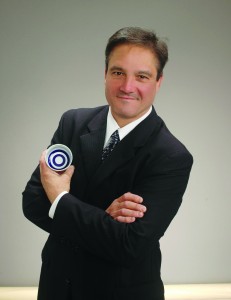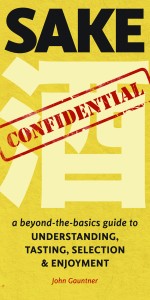JQ Magazine: JQ&A with John Gaunter on ‘Sake Confidential’

“Sake is so deep and varied that one could never stop talking about it. Every day is full of surprises. Not major ones, but usually surprises related to the attention to detail that goes into sake and the interesting stories behind it.” (Courtesy of John Gauntner)
By Eden Law (Fukushima-ken, 2010-11) for JQ magazine. Eden is a JETAA New South Wales committee member, who would like it to be known that if it wasn’t for getting involved with JETAA, he wouldn’t know what to do with his spare time after hours. JET: It’s like the Illuminati, except less about the world domination and more about the fun denomination. Got feedback on this article? Leave a comment below.
If ever there was a prize for most unexpected job opportunity spin-off from the JET Program, the career of John Gauntner (Kanagawa-ken, 1988-89) would be hard to beat, especially after a few rounds of nihonshu. A longtime resident of Kamakura and the world’s first (and only) non-Japanese to hold certification as both a Master of Sake Tasting and Sake Expert Assessor, Gauntner has come a long way since a drinking session with a buddy from The Japan Times led him to this series of fortunate events.
Proving that this beverage continues to be an infinite font of inspiration, Gauntner has recently added a new book to his growing stable of literary output, Sake Confidential: A Beyond-the-Basics Guide to Understanding, Tasting, Selection, and Enjoyment. In it, he covers all aspects of the precious drop: from what it is, how it is made, and how it is meant to be enjoyed (spoiler: any way you like it), to the inside story of its politics, marketing, and the industry itself. But this is no textbook: Like a true sake evangelist, Gauntner enlightens beginners and insiders alike, pairing clear and simple language with confidence and unabashed passion.
In this exclusive interview, Gauntner discusses the state of sake’s popularity in its own country and abroad, what it means being a non-Japanese sake evangelist with his unique qualifications, and what the future holds for him.
What was the reason behind writing this book, and who is its audience?
I wanted to show the depth and breadth of the sake world, to show it has as many avenues for exploration as wine does.
How is this book different from the others?
This book goes beyond the basics and more into depth about many interesting side topics of the sake world.
Is this book designed to replace or update your previous books?
No, it is intended to augment them. This one introduces less sake and is light on the basics,
What’s the market like for these books?
So far it is selling well, but ask me in two years!
What’s left to be said about sake? Are there any surprises left in the industry?
It is so deep and varied that one could never stop talking about it. Every day is full of surprises. Not major ones, but usually surprises related to the attention to detail that goes into sake and the interesting stories behind it.
How has the JET and JETAA community, whether officially or unofficially, continued to play a part in your life and your occupation? We know that JET was how you got started down this path, but how do you continue to use your connections with the community?
While my memories of JET are fond and while it did get me going on this path, I have to admit I do not stay in as close contact as maybe I should.
In a previous interview, you mentioned how your prefecture is starting to transform and become more used to non-Japanese people, largely due to JET. Do you play a part in the JET community in your prefecture?
Not any more, in all honesty.
What are your thoughts on the plan to increase the number of JET participants?
I do think it is a mutually beneficial and positive thing and want to encourage that!
If there’s one thing you wish you could educate people on about sake, what would that be? What do you often get tired most often about being asked?
Simply how good premium sake can be. Sure, there is lots of cheap stuff out there that is bland, but once into the top 20% of all sake, the realm of premium sake, the diversity and potential are massive. That is what I want folks to know: it is a deep, broad world of connoisseurship.
What’s the actual popularity of sake itself in its own home country? Is it being overtaken by other beverages, like wine?
Yes, overall it is down to less than 8% of all consumed alcohol. However, the consumption and popularity of premium sake both domestically and overseas is growing.
You mention how the sake industry in Japan is shrinking, and only a few see any kind of return from this business. Is the industry in danger of disappearing in a few generations? What can the industry do to improve and survive?
No, it will not disappear, but it might shake out a bit more. They need to learn to cooperate better as an industry, that is all.
Does being a sake expert bring the same kind of awe and glamour as a wine expert? In fact, is there any such thing as a sommelier for sake? Why not? It might be an interesting niche market.
Not much glamor or awe at all, but lots of fun since I love it personally. There are sake soms, but nothing as organized or official as the wine world, because the industry never cooperated to make it happen.
How has sake awareness changed since you’ve started your “sake evangelism”? How does the outside world now come to regard sake, compared to when you first started, for instance? Did it ever have the same respect as wine currently holds in non-Japanese countries?
Respect for sake has grown appreciably, yes. It never has had the respect wine has, but that is changing as any som worth his or her salt needs to know about sake, and they are all interested and studying.
Apart from writing and doing speaking tours and culinary nights, how else have you been involved in the industry? Are all of these activities your day job?
Speaking, writing and reading comprise 80% of my work, but I do export a bit of sake to the U.S. too.
What kind of cachet or advantages does the status of being the only non-Japanese certified sake expert bring? Have you ever been in a situation where you would correct a Japanese person on the subject, and how did they react?
It is much more mundane that you might imagine. I enjoy sake too much to be pedantic, and have never had a situation where I needed to challenge someone.
How do Japanese people see you? Are they even aware of that there’s such a thing as a sake expert?
The industry appreciates my presence as I educate the world on their great craft product. The rest of Japan does not even know I exist. ;-)
Have you ever considered lecturing in other countries other than in Japan and the U.S.?
Yes, and in fact, I just did a three-day seminar in Singapore. Sake is catching on around the world and these chances will likely increase.
What’s next? That is, other projects that we can look forward to seeing from you.
That is easy: the world’s first and only sake-only all English magazine, Sake Today. I want and intend to make this the voice for sake for fans all over the world. Check it out at www.sake-today.com.
Visit John’s homepage at http://sake-world.com.
For more JQ magazine interviews, click here.



Comments are closed.